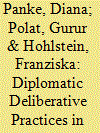| Srl | Item |
| 1 |
ID:
189266


|
|
|
|
|
| Summary/Abstract |
Scholars have demonstrated that deliberation between political actors in states as well as in International Organizations (IOs) matters because it can impact the quality and legitimacy of outcomes. Yet, we do not know much about how deliberation between political actors can be triggered in practice. Drawing on insights from the deliberative turn that has taken place in Comparative Politics as well as insights from International Relations, this paper inquires how different IO institutional features effect the extent of diplomatic deliberation. Unique and novel survey data shows that there is variation between and within IOs. In some IOs, such as the UNFCCC or CoE, diplomats engage in extensive deliberations, while they do so considerably less in others, such as the UNWTO or IWC. Our paper provides novel insights into the inner working of IOs. In general, diplomatic debates are most pronounced in large IOs with high level delegates that often opt for negotiating behind closed doors. In addition, specific institutional design elements matter in the different stages of an IO policy-cycle, such as procedural rules fostering interaction between diplomats in the negotiation stage or a limited policy scope in the voting stage.
|
|
|
|
|
|
|
|
|
|
|
|
|
|
|
|
| 2 |
ID:
188704


|
|
|
|
|
| Summary/Abstract |
The performance of individual international organizations (IOs) has received considerable scholarly attention, not in the least because their importance for global governance. This paper adds to this body of work by adopting genuine comparative lenses. Based on a novel survey, it assesses the attributed performance of 49 IOs over two important dimensions: problem-solving effectiveness and legitimacy of outputs. This reveals variation between IOs with respect to both components. We derive hypotheses from international cooperation and IO design. The quantitative analysis reveals that except deliberative diplomatic practices many factors increasing attributed legitimacy differ from the ones increasing the attributed problem-solving effectiveness. Most notably, autonomous secretariats increase the problem-solving effectiveness attributed to IOs. Legitimacy attributions increase when IOs are regional instead of global in nature and when non-state actors have access to IO decision-making.
|
|
|
|
|
|
|
|
|
|
|
|
|
|
|
|